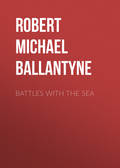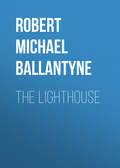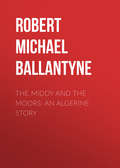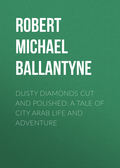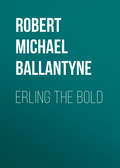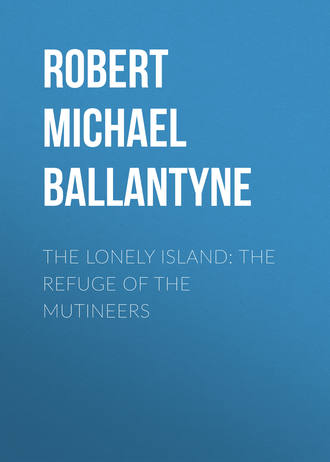
Robert Michael Ballantyne
The Lonely Island: The Refuge of the Mutineers
Chapter Nineteen
The Darkest Hour
A long time after the events narrated in the last chapter, John Adams and Edward Young sat together one evening in the cave at the top of the mountain, where poor Fletcher Christian had been wont to hold his lonely vigils.
“I’ve bin thinkin’ of late,” said Young, “that it is very foolish of us to content ourselves with merely fishing from the rocks, when there are better fish to be had in deep water, and plenty of material at hand for making canoes.”
“You’re right, sir; we ought to try our hands at a canoe. Pity we didn’t do so before the native men was all killed. They knew what sort o’ trees to use, and how to split ’em up into planks, an’ all that sort o’ thing.”
“But McCoy used to study that subject, and talk much about it, when we were in Otaheite,” returned Young. “I’ve no doubt that with his aid we could build a good enough canoe, and the women would be as able as the men, no doubt, to direct us what to do if we were in a difficulty. McCoy is a handy fellow, you know, with tools, as he has proved more than once since the death of poor Williams.”
Adams shook his head.
“No doubt, Mr Young, he’s handy enough with the tools; but ever since he discovered how to make spirits, neither he nor Quintal, as you know, sir, are fit for anything.”
“True,” said Young, with a perplexed look; “it never occurred to me before that strong drink was such a curse. I begin now to understand why some men that I have known have been so enthusiastic in their outcry against it. Perhaps it would be right for you and me to refuse to drink with Quintal and McCoy, seeing that they are evidently killing themselves with it.”
“I don’t quite see that, sir,” objected Adams. “A glass of grog don’t do me no harm that I knows of, an’ it wouldn’t do them no good if we was to stop our allowance.”
“It might; who can tell?” said Young. “I’ve not thought much about the matter, however, so we won’t discuss it. But what would you say if we were to hide the kettle that McCoy makes it in, and refuse to give it up till the canoe is finished?”
Again Adams shook his head.
“They’d both go mad with DT,” said he, by which letters he referred to the drunkard’s awful disease, delirium tremens.
“Well, at all events, we will try to persuade him to go to work, and the sooner the better,” said Young, rising and leaving the cave.
In pursuance of this plan, Young spoke to McCoy in one of his few sober moments, and got him persuaded to begin the work, and to drink less while engaged in it.
Under the impulse of this novelty in his occupation, the unhappy man did make an attempt to curb himself, and succeeded so far that he worked pretty steadily for several days, and made considerable progress with the canoe.
The wood was chosen, the tree felled, the trunk cut to the proper length and split up into very fair planks, which were further smoothed by means of a stone adze, brought by the natives from Otaheite, and it seemed as if the job would be quickly finished, when the terrible demon by whom McCoy had been enslaved suddenly asserted his tyrannical power. Quintal, who rendered no assistance in canoe-building, had employed himself in making a “new brew,” as he expressed it, and McCoy went up to his hut in the mountain one evening to taste.
The result, of course, was that he was absolutely incapable of work next day; and then, giving way to the maddening desire, he and his comrade-in-debauchery went in, as they said, for a regular spree. It lasted for more than a week, and when it came to an end, the two men, with cracked lips, bloodshot eyes, and haggard faces, looked as if they had just escaped from a madhouse.
Edward Young now positively refused to drink any more of the spirits, and Adams, although he would not go quite to that length, restricted himself to one glass in the day.
This at first enraged both Quintal and McCoy. The former cursed his comrades in unmeasured terms, and drank more deeply just to spite them. The latter refused to work at the canoe, and both men became so uproarious, that Young and Adams were obliged to turn them out of the house where they were wont occasionally to meet for a social evening.
Thus things went on for many a day from bad to worse. Bad as things had been in former years, it seemed as if the profoundest depth of sin and misery had not yet been fathomed by these unhappy mutineers.
In all these doings, it would have gone hard with the poor women and children if Adams and Young had not increased in their kindness and consideration for them, as the other two men became more savage and tyrannical.
At last matters came to such a crisis that it became once more a matter of discussion with Young and Adams whether they should not destroy the machinery by which the spirits were made, and it is probable that they might have done this, if events had not occurred which rendered the act unnecessary.
One day William McCoy was proceeding with a very uncertain step along the winding footpath that led to his house up in the mountain. The man’s face worked convulsively, and it seemed as if terrible thoughts filled his brain. Muttering to himself as he staggered along, he suddenly met his own son, who had grown apace by that time, being nearly seven years of age. Both father and son stopped abruptly, and looked intently at each other.
“What brings you here?” demanded the father, with a look of as much dignity as it was in his power to assume.
The poor boy hesitated, and looked frightened. His natural spirit of fun and frolic seemed of late to have forsaken him.
“What are ’ee afraid of?” roared McCoy, who had not quite recovered from his last fit of delirium tremens. “Why don’t ’ee speak?”
“Mother’s not well,” said Daniel, softly; “she bid me come and tell you.”
“What’s that to me?” cried McCoy, savagely. “Come here, Dan.” He lowered his tone, and held out his hand, but the poor boy was afraid to approach.
Uttering a low growl, the father made a rush at him, stumbled over a tree-root, and fell heavily to the earth. Little Dan darted into the bush, and fled home.
Rising slowly, McCoy looked half-stunned at first, but speedily recovering himself, staggered on till he reached the hut, when he wildly seized the bottle from its shelf, and put it to his lips, which were bleeding from the fall, and covered with dust.
“Ha ha!” he shouted, while the light of delirium rekindled in his eyes, “this is the grand cure for everything. My own son’s afraid o’ me now, but who cares? What’s that to Bill McCoy! an’ his mother’s ill too—ha!—”
He checked himself in the middle of a fierce laugh, and stared before him as if horror-stricken.
“No, no!” he gasped. “I—I didn’t. Oh! God be merciful to me!”
Again he stopped, raised both hands high above his head, uttered a wild laugh which terminated in a prolonged yell, as he dashed the bottle on the floor, and darted from the hut.
All the strength and vigour which the wretched man had squandered seemed to come back to him in that hour. The swiftness of youth returned to his limbs. He ran down the path by which he had just come, and passed Quintal on the way.
“Hallo, Bill! you’re pretty bad to-night,” said his comrade, looking after him. He then followed at a smart run, as if some new idea had suddenly occurred to him. Two of the women met McCoy further down, but as if to evade them, he darted away to the right along the track leading to the eastward cliffs. The women joined Quintal in pursuit, but before they came near him, they saw him rush to the highest part of the cliffs and leap up into the air, turning completely over as he vanished from their sight.
At that spot the cliff appeared to overhang its base, and was several hundred feet high. Far down there was a projecting rock, where sea-gulls clustered in great numbers. McCoy, like the lightning-flash, came in contact with the rock, and was dashed violently out into space, while the affrighted sea-birds fled shrieking from the spot. Next moment the man’s mangled body cleft the dark water like an arrow, leaving only a little spot of foam behind to mark for a few seconds his watery grave.
It might have been thought that this terrible event would have had a sobering effect upon Matthew Quintal, but instead of that it made him worse. The death of his wife, too, by a fall from the cliffs about the same time, seemed only to have the effect of rendering him more savage; insomuch that he became a terror to the whole community, and frequently threatened to take the lives of his remaining comrades. In short, the man seemed to have gone mad, and Young and Adams resolved, in self-defence, to put him to death.
We spare the reader the sickening details. They accomplished the terrible deed with an axe, and thus the number of the male refugees on Pitcairn was reduced to two. The darkest hour of the lonely island had been reached—the hour before the dawn.
Chapter Twenty
The Dawn of a Better Day
The eighteenth century passed away, and as the nineteenth began its course, a great and marvellous change came over the dwellers on the lonely island in that almost unknown region of the Southern Seas. It was a change both spiritual and physical, the latter resulting from the former, and both having their roots, as all things good must have, in the blessed laws of God.
The change did not come instantaneously. It rose upon Pitcairn with the sure but gradual influence of the morning dawn, and its progress, like its advent, was unique in the history of the Church of God.
No preacher went forth to the ignorant people, armed with the powers of a more or less correct theology. No prejudices had to be overcome, or pre-existing forms of idolatry uprooted, and the people who had to be changed were what might have been deemed most unlikely soil—mutineers, murderers, and their descendants. The one hopeful characteristic among them was the natural amiability of the women, for Young and Adams did not display more than the average good-humour of men, yet these amiable women, as we have seen, twice plotted and attempted the destruction of the men, and two of them murdered in cold blood two of their own kinsmen.
It may, perhaps, have already been seen that Young and Adams were of a grave and earnest turn of mind. The terrible scenes which they had passed through naturally deepened this characteristic, especially when they thought of the dreadful necessity which had been forced on them—the deliberate slaying of Matthew Quintal, an act which caused them to feel like murderers, however justifiable it may have seemed to them.
Like most men who are under deep and serious impressions, they kept their thoughts to themselves. Indeed, John Adams, with his grave matter-of-fact tendencies and undemonstrative disposition, would probably never have opened his lips on spiritual things to his companion if Young had not broken the ice; and even when the latter did venture to do so, Adams resisted at first with the dogged resolution of an unbelieving man.
“We’ve been awful sinners, John Adams,” said Young one afternoon as they were sauntering home from their plantations to dinner.
“Well, sir, no doubt there’s some truth in what you say,” replied Adams, slowly, “but then, d’ye see, we’ve bin placed in what you may call awful circumstances.”
“That’s true, that’s true,” returned Young, with a perplexed look, “and I’ve said the same thing, or something like it, to myself many a time; but, man, the Bible doesn’t seem to harmonise with that idea somehow. It seems to make no difference between big and little sinners, so to speak, at least as far as the matter of salvation is concerned; and yet I can’t help feeling somehow that men who have sinned much ought to repent much.”
“Just so, sir,” said John Adams, with a self-satisfied air, “you’re right, sir. We have been awful sinners, as you say, an’ now we’ve got to repent as hard as we can and lead better lives, though, of course, we can’t make much difference in our style o’ livin’, seein’ that our circumstances don’t allow o’ much change, an’ neither of us has bin much given to drink or swearin’.”
“Strange!” rejoined Young. “You almost echo what I’ve been saying to myself over and over again, yet I can’t feel quite easy, for if we have only got to repent and try to lead better lives, what’s the use of our talking about ‘Our Saviour?’ and what does the Bible mean in such words as these: ‘Believe on the Lord Jesus Christ and thou shalt be saved.’ ‘Only believe.’ ‘By grace are ye saved, through faith, and that not of yourselves, it is the gift of God.’ ‘By the works of the law shall no flesh living be justified.’”
“Do you mean to say, sir, that them words are all out of the Bible?” asked Adams.
“Yes, I know they are, for I read them all this morning. I had a long hunt after the Bible before I found it, for poor Christian never told me where he kept it. I turned it up at last under a bit of tarpaulin in the cave, and I’ve been reading it a good deal since, and I confess that I’ve been much puzzled. Hold on a bit here,” he added, stopping and seating himself on a flowering bank beside the path; “that old complaint of mine has been troubling me a good deal of late. Let’s rest a bit.”
Young referred here to an asthmatic affection to which he was subject, and which had begun to give him more annoyance since the catching of a severe cold while out shooting among the hills a year before.
“From what you say, sir,” said Adams, thoughtfully, after they had sat down, “it seems to me that if we can do nothing in the matter o’ workin’ out our salvation, and have nothin’ to do but sit still an’ receive it, we can’t be to blame if we don’t get it.”
“But we may be to blame for refusing it when it’s offered,” returned Young. “Besides, the Bible says, ‘Ask and ye shall receive,’ so that knocks away the ground from under your notion of sitting still.”
“P’r’aps you’re right, sir,” continued Adams, after a few minutes’ thought, during which he shook his head slowly as if not convinced; “but I can’t help thinkin’ that if a man only does his best to do his dooty, it’ll be all right with him. That’s all that’s required in His Majesty’s service, you know, of any man.”
“True, but if a man doesn’t do his best, what then? Or if he is so careless about learning his duty that he scarce knows what it is, and in consequence falls into sundry gross mistakes, what then? Moreover, suppose that you and I, having both done our duty perfectly up to the time of the mutiny, were now to go back to England and say, like the bad boys, ‘We will never do it again,’ what would come of it, think you?”
“We’d both be hanged for certain,” answered Adams, with emphasis.
“Well, then, the matter isn’t as simple an you thought it, at least according to your view.”
“It is more puzzlin’ than I thought it,” returned Adams; “but then that’s no great wonder, for if it puzzles you it’s no wonder that it should puzzle me, who has had no edication whatever ’xcep what I’ve picked up in the streets. But it surprises me—you’ll excuse me, Mr Young—that you who’s bin at school shouldn’t have your mind more clear about religion. Don’t they teach it at school?”
“They used to read a few verses of the Bible where I was at school,” said Young, “and the master, who didn’t seem to have any religion in himself, read over a formal prayer; but I fear that that didn’t do us much good, for we never listened to it. Anyhow, it could not be called religious teaching. But were you never at school, Adams?”
“No, sir, not I,” answered the seaman, with a quiet laugh; “leastwise not at a reg’lar true-blue school. I was brought up chiefly in the streets of London, though that’s a pretty good school too of its kind. It teaches lads to be uncommon smart, I tell you, and up to a thing or two, but it don’t do much for us in the book-larnin’ way. I can scarcely read even now, an’ what I have of it was got through spellin’ out the playbills in the public-house windows. But what d’ye say, sir, now that we both seem inclined to turn over a new leaf, if you was to turn schoolmaster an’ teach me to read and write a bit better than I can do at present? I’d promise to be a willin’ scholar an’ a good boy.”
“Not a bad idea,” said Young, with a laugh, as he rose and continued the descent of the track leading to the settlement.
The village had by this time improved very much in appearance, good substantial cottages, made of the tafano or flower wood, and the aruni, having taken the place of the original huts run up at the period of landing. Some of the cottages were from forty to fifty feet long, by fifteen wide and thirteen high. It was evident that ships were, partly at least, the model on which they had been constructed; for the sleeping-places were a row of berths opposite the door, each with its separate little window or porthole. There were no fireplaces, the range of the thermometer on the island being from 55 degrees to 85 degrees, and all cooking operations were performed in detached outhouses and ovens.
In the chief of these cottages might have been found, among the many miscellaneous objects of use and ornament, two articles which lay apart on a shelf, and were guarded by Young and Adams with almost reverential care. These were the chronometer and the azimuth compass of the Bounty.
The cottages, some of which had two stories, were arranged so as to enclose a large grassy square, which was guarded by a strong palisade from the encroachments of errant hogs, goats, and fowls. This spot, among other uses, served as a convenient day-nursery for the babies, and also a place of occasional frolic and recreation to the elder children.
To the first of these was added, not long after the death of their respective fathers, Edward Quintal and Catherine McCoy. To John Adams, also, a daughter was born, whom he named Hannah, after a poor girl who had been in the habit of chucking him under the chin, and giving him sugar-plums when he was an arab in the streets of London—at least so he jestingly remarked to his spouse on the day she presented the new baby to his notice.
On the day of which we write, Young and Adams found the square above-mentioned in possession of the infantry, under command of their self-elected captain, Otaheitan Sally, who was now, according to John Adams, “no longer a chicken.” Being in her eleventh year, and, like her country-women generally at that age, far advanced towards big girlhood, she presented a tall, slight, graceful, and beautifully moulded figure, with a sweet sprightly face, and a smile that was ever disclosing her fine white teeth. Her profusion of black hair was gathered into a knot which hung low on the back of her pretty round head. She was crowned with a wreath of wild-flowers, made and presented by her troops. It is needless to say that every one of these, big and little, was passionately attached to Sally.
Chief among her admirers now, as of old, was Charlie Christian, who, being about eight years of age, well grown and stalwart like his father, was now almost as tall as his former nurse.
Charlie had not with years lost one jot of that intensely innocent and guileless look of childhood, which inclined one to laugh while he merely cast earnest gaze into one’s face; but years had given to him a certain gravity and air of self-possession which commanded respect, even from that volatile imp, his contemporary, Dan McCoy.
Thursday October Christian, who was less than a year younger than Sally, had also shot up into a long-legged boy, and bade fair to become a tall and sturdy man. He, like his brother, was naturally grave and earnest, but was easily roused to action, and if he did not himself originate fun, was ever ready to appreciate the antics and mild wickedness of Dan McCoy, or to burst into sudden and uproarious laughter at the tumbles or ludicrous doings of the sprawlers, who rolled their plump-made forms on the soft grass.
Not one of the band, however, had yet attained to the age which renders young people ashamed of childish play. When Young and Adams appeared on the scene, Sally, her hair broken loose and the wreath confusedly mingled with it, was flying round the square with Dolly Young on her shoulder, and chased by Charlie Christian, who pretended, in the most obvious manner, that he could not catch her. Toc was sitting on the fence watching them, and perceiving his brother’s transparent hypocrisy, was chuckling to himself with great delight.
Matt Quintal and Dan McCoy, at the head of two opposing groups, were engaged in playing French and English, each group endeavouring to pull the other over a rope laid on the grass between them.
Several of the others, being too little, were not allowed to join in the game, and contented themselves with general scrimmaging and skylarking, while Edward Quintal, Catherine McCoy, and Hannah Adams, the most recent additions to the community, rolled about in meaningless felicity.
“Hold on hard,” shouted Dan McCoy, whose flushed face and blue eyes beamed and flashed under a mass of curling yellow hair, and who was the foremost boy of the French band.
“I’m holdin’ on,” cried Matt Quintal, who was intellectually rather obtuse.
“Tight,” cried Dan.
“Tight,” repeated Matt.
“There, don’t let go—oh! hup!”
The grasp of Dan suddenly relaxed when Matt and his Englishmen were straining their utmost. Of course they went back on the top of each other in a wild jumble, while Dan, having put a foot well back, was prepared, and stood comparatively firm.
“You did that a-purpose,” cried Matt, springing up and glaring.
“I know you did it a-purpose,” retorted Dan.
“But—but I said that—that you did it a-purpose,” stammered Matt.
“Well, an’ didn’t I say that you said that I said you did it a-purpose?”
A yell of delight followed this reply, in which, however, Matt did not join.
Like his father, Matt Quintal was short in the temper—at least, short for a Pitcairn boy. He suddenly gave Dan McCoy a dab on the nose with his fist. Now, as every one must know, a dab on the nose is painful; moreover, it sometimes produces blood. Dan McCoy, who also inherited a shortish temper from his father, feeling the pain, and seeing the blood, suddenly flushed to the temples, and administered to Matt a sounding slap on the side of the head, which sent him tumbling on the grass. But Matt was not conquered, though overturned. Jumping up, he made a rush at Dan, who stood on the defensive. The other children, being more gentle in their natures, stood by, and anticipated with feelings of awe the threatened encounter; but Thursday October Christian, who had listened with eager ears, ever since his intelligence dawned, to the conversations of the mutineers, here stepped between the combatants.
“Come, come,” said he, authoritatively, in virtue of his greater age and superior size, “let’s have fair play. If you must fight, do it ship-shape, an’, accordin’ to the articles of war. We must form a ring first, you know, an’ get a bottle an’ a sponge and—”
An appalling yell at this point nearly froze the marrow in everybody’s bones. It was caused by a huge pig, which, observing that the gate had been left open, had entered the square, and gone up to snuff at one of the nude babies, who, seated like a whitey-brown petrifaction, gazed with a look of horror in the pig’s placid face.
If ever a pig in this sublunary sphere regretted a foolish act, that Pitcairn pig must have been steeped in repentance to the latest day of its life. With one howl in unison, the entire field, minus the infants, ran at that pig like a human tornado. It was of no avail that the pig made straight for the gate by which it had entered. That gate had either removed or shut itself. In frantic haste, the unhappy creature coursed round the square, followed by its pursuers, who soon caught it by the tail, then by an ear, then by the nose and the other ear, and a fore leg and two hind ones, and finally hurled it over the fence, amid a torrent of shrieks which only a Pitcairn pig could utter or a Pitcairn mind conceive. It fell with a bursting squeak, and retired in grumpy silence to ruminate over the dire consequences of a too earnest gaze in the face of a child.
“Well done, child’n!” cried John Adams. “Sarves him right. Come, now, to grub, all of you.”
Even though the Pitcairn children had been disobedient by nature, they would have obeyed that order with alacrity. In a few brief minutes a profound silence proclaimed, more clearly than could a trumpet-tongue, that the inhabitants of the lonely island were at dinner.



